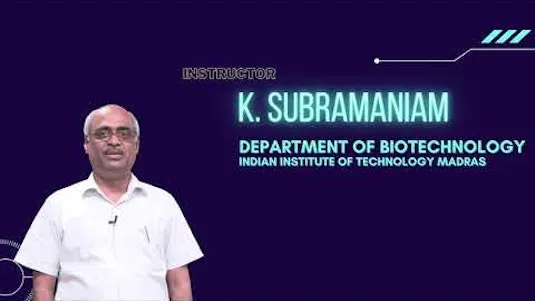
Biochemistry - IITM 
This course provides an introduction to the fundamentals of biochemistry, exploring how the few elements of life are used to form complex molecules and how these processes are interconnected and regulated. Students will learn about topics such as structural biology, biotechnology, genomics and proteomics. This course is intended for life sciences undergraduate students with introductory-level organic chemistry and biology. No industry support is required. ▼
ADVERTISEMENT
Course Feature
![]() Cost:
Cost:
Free
![]() Provider:
Provider:
Swayam
![]() Certificate:
Certificate:
Paid Certification
![]() Language:
Language:
English
![]() Start Date:
Start Date:
22nd Jan, 2023
Course Overview
❗The content presented here is sourced directly from Swayam platform. For comprehensive course details, including enrollment information, simply click on the 'Go to class' link on our website.
Updated in [May 25th, 2023]
This course, Biochemistry - IITM, provides an overview of the immense diversity of life and how it is formed using fewer than ten elements. Students will gain a thorough grounding on the fundamental concepts of biochemistry, and learn more advanced topics of biology such as structural biology, biotechnology, genomics and proteomics. This course is intended for life sciences undergraduate students who have an introductory-level knowledge of organic chemistry and biology. No industries are supported by this course.
[Applications]
The application of this course can be seen in various industries such as biotechnology, genomics, proteomics, and structural biology. Students who have taken this course will be able to understand the fundamental concepts of biochemistry and apply them to their respective fields. They will also be able to use the knowledge gained from this course to develop new technologies and products. Additionally, they will be able to use the knowledge gained from this course to understand the complex molecular processes of life and how they are regulated.
[Career Paths]
1. Biochemist: Biochemists study the chemical and physical properties of living organisms and their components. They use their knowledge to develop new drugs, diagnose diseases, and understand the processes of life. Biochemists are in high demand in the pharmaceutical, biotechnology, and medical industries, and their research is essential for the development of new treatments and cures.
2. Molecular Biologist: Molecular biologists study the structure and function of genes and proteins at the molecular level. They use their knowledge to develop new treatments and cures for diseases, and to understand the processes of life. Molecular biologists are in high demand in the pharmaceutical, biotechnology, and medical industries, and their research is essential for the development of new treatments and cures.
3. Bioinformatician: Bioinformaticians use computer science and mathematics to analyze and interpret biological data. They use their knowledge to develop new treatments and cures for diseases, and to understand the processes of life. Bioinformaticians are in high demand in the pharmaceutical, biotechnology, and medical industries, and their research is essential for the development of new treatments and cures.
4. Biomedical Engineer: Biomedical engineers use engineering principles to design and develop medical devices and systems. They use their knowledge to develop new treatments and cures for diseases, and to understand the processes of life. Biomedical engineers are in high demand in the pharmaceutical, biotechnology, and medical industries, and their research is essential for the development of new treatments and cures.
[Education Paths]
1. Bachelor of Science in Biochemistry: A Bachelor of Science in Biochemistry is a four-year degree program that provides students with a comprehensive understanding of the chemical processes that occur in living organisms. Students learn about the structure and function of proteins, carbohydrates, lipids, and nucleic acids, as well as the metabolic pathways that regulate their production and degradation. This degree is becoming increasingly popular as biochemistry is becoming more important in the development of new drugs and treatments for diseases.
2. Master of Science in Biochemistry: A Master of Science in Biochemistry is a two-year degree program that provides students with a more in-depth understanding of the chemical processes that occur in living organisms. Students learn about the structure and function of proteins, carbohydrates, lipids, and nucleic acids, as well as the metabolic pathways that regulate their production and degradation. This degree is becoming increasingly popular as biochemistry is becoming more important in the development of new drugs and treatments for diseases.
3. Doctor of Philosophy in Biochemistry: A Doctor of Philosophy in Biochemistry is a four-year degree program that provides students with a comprehensive understanding of the chemical processes that occur in living organisms. Students learn about the structure and function of proteins, carbohydrates, lipids, and nucleic acids, as well as the metabolic pathways that regulate their production and degradation. This degree is becoming increasingly popular as biochemistry is becoming more important in the development of new drugs and treatments for diseases.
4. Doctor of Medicine in Biochemistry: A Doctor of Medicine in Biochemistry is a four-year degree program that provides students with a comprehensive understanding of the chemical processes that occur in living organisms. Students learn about the structure and function of proteins, carbohydrates, lipids, and nucleic acids, as well as the metabolic pathways that regulate their production and degradation. This degree is becoming increasingly popular as biochemistry is becoming more important in the development of new drugs and treatments for diseases.
Course Provider

Provider Swayam's Stats at AZClass
Discussion and Reviews
0.0 (Based on 0 reviews)
Explore Similar Online Courses

Economics : Behavior of Buyers and Sellers & Product Pricing
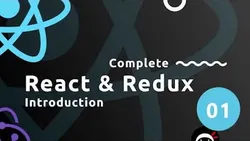
Complete React Tutorial (with Redux)

Python for Informatics: Exploring Information

Social Network Analysis

Introduction to Systematic Review and Meta-Analysis

The Analytics Edge

DCO042 - Python For Informatics

Causal Diagrams: Draw Your Assumptions Before Your Conclusions

Whole genome sequencing of bacterial genomes - tools and applications
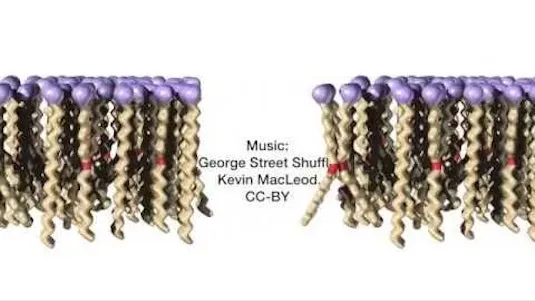
Principles of Biochemistry
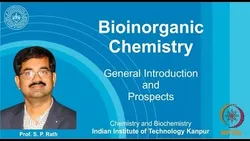
Bioinorganic Chemistry
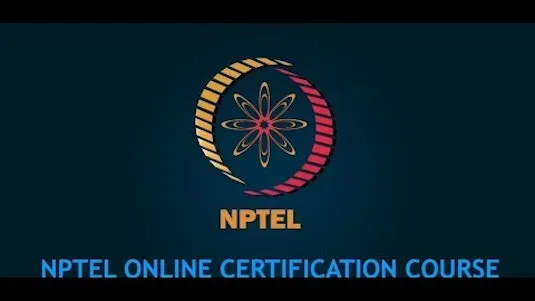
Essentials of Biomolecules : Nucleic Acids and Peptides
 Related Categories
Related Categories
 Popular Providers
Popular Providers
 Popular Searches
Popular Searches
Quiz
 Submitted Sucessfully
Submitted Sucessfully
1. What is the intended audience for the Biochemistry course?
2. What are the prerequisites for the Biochemistry course?
3. Which of the following is not supported by the Biochemistry course?
4. What is the study of how the complex molecules of life are assembled and disassembled back?
Correct Answer: Biochemistry


Start your review of Biochemistry - IITM